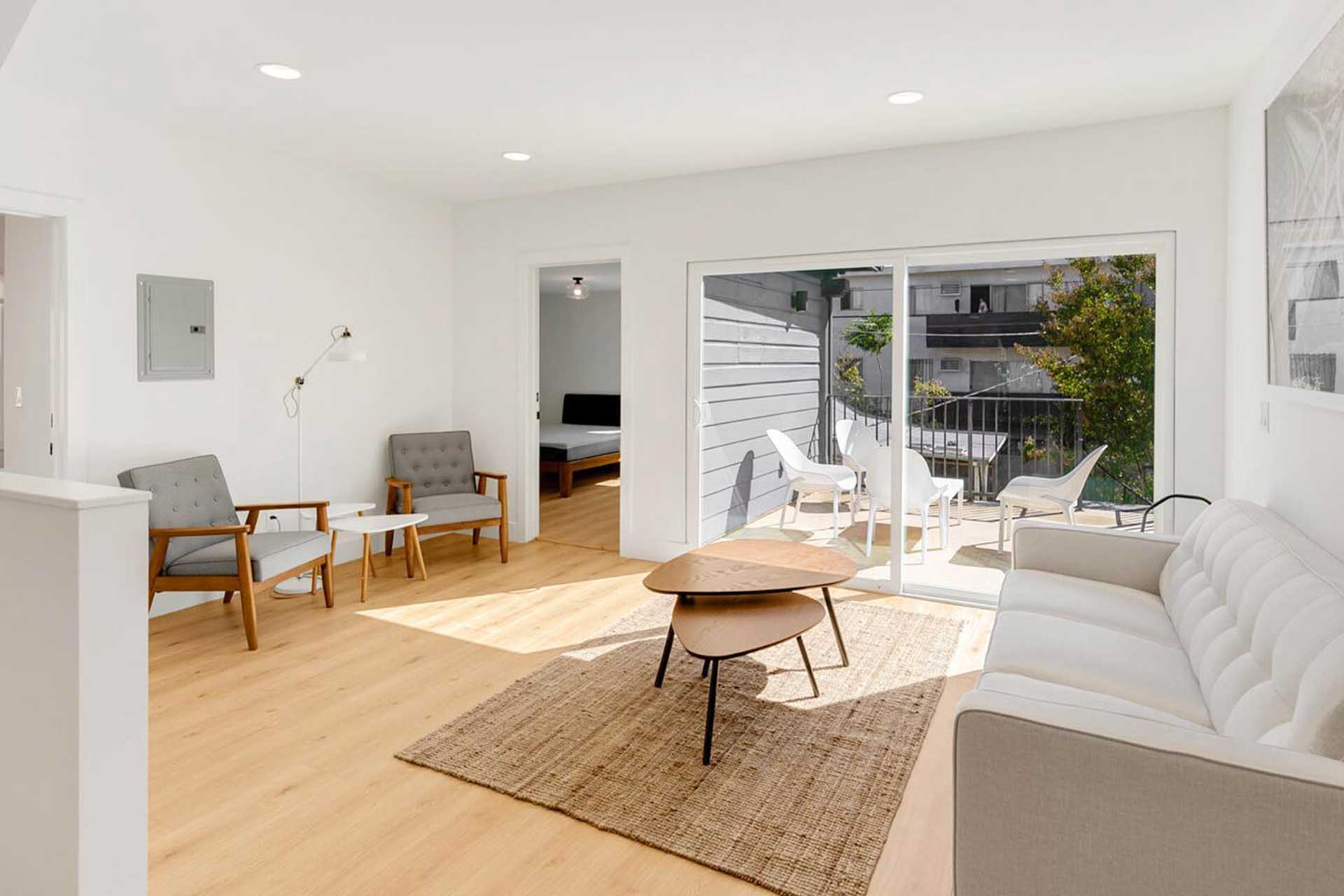The global COVID-19 pandemic has accelerated the movement towards Coliving. Coliving is an antidote to isolation, and recent years have highlighted the effects of loneliness that results from quarantine and physical distancing. This is one of the many reasons Coliving continues to gain increasing popularity amongst the urban population.
Coliving provides an alternative to conventional rental options and a solution to housing affordability, a social issue most pronounced in large cities. While many individuals are drawn to Coliving for economic reasons, many also realize the social benefits of living within a community.
Human connection is the strongest connection. Studies have proven that our mental health is enhanced significantly by developing strong relationships with others around us. Nearly every aspect of our lives within human society is based on social relationships, as evidenced by our decisions about our families, friends, workplaces, and our residences.
Coliving is the nexus of community- driven spaces that encourages social contact every day if one chooses to. Therefore, it should not be surprising that communities and, by extension, Coliving provides many advantages for one’s health and well-being. We have closely examined how Coliving affects our emotion and mental well-being, social character and personal development.
Letting Humans Be Social Animals
The notion of Coliving is centered around the sharing of resources, living spaces and lifestyles. Coliving can foster a strong sense of community, leading to increased social support and reduced feelings of loneliness. The unconventional real estate market of Coliving can set the pace for advancing breakthroughs in social impact and in turn, environmental sustainability.
Stronger Social Ties: Living with others in a Coliving arrangement often leads to the development of strong social ties. Residents can share meals, engage in hobbies and activities, and provide emotional support to one another, leading to a sense of belonging and increased social connectedness.
Increased Opportunities for Interaction: Coliving accommodations typically have common areas such as kitchens, living rooms, gardens, patios and recreation rooms which allow for different levels of interaction so residents can engage with one another on a daily basis.
Diverse Community: A multi resident property could potentially attract individuals from a myriad backgrounds, cultures and professions. This diversity can only enrich a person’s exposure to different perspectives and ways of life. A melting pot of people, ideas and life experiences are vital ingredients for the betterment of society.
Shared Experiences: Coliving residents share experiences and create memories together, leading to stronger bonds and a sense of community.
Reduced Loneliness: For lone individuals isolated from their social networks, Coliving provides an instant community of support. As a result, this comfort mitigates feelings of loneliness, isolation or depression.
Overall, Coliving can be a powerful way to build and strengthen community, leading to increased social connectedness, personal growth, and overall wellbeing.
Keeping Humans Sane
The criteria and research established by Well state that “mental health is not just the absence of a mental health issue. Instead, it is a condition of well-being in which people can reach their full potential, handle everyday challenges, do fruitful work, and give back to their community.”
The fundamental concept of shared living is that people are naturally social beings, regardless of age or circumstance. And without that, humans struggle.
Humans have a wide range of problems when their mental health is impaired, including a higher risk of heart disease, memory loss, anxiety, diabetes, joint problems, stress, drug addiction, and in severe cases, suicide. With Coliving, these risks reduce because of the following:
Social Support: Living in a supportive, communicative community can help reduce feelings of loneliness and isolation, leading to improved mental health. By fostering a community of connections and friendships, Coliving Spaces assist people going through life changes and transitioning into new environments.
Increased Social Interaction: Coliving spaces provide opportunities for residents to interact and engage with one another on a daily basis, which can help improve mood and reduce symptoms of depression. They also offer the much needed peace and solitude by way of individual private rooms.
Reduced Financial Stress: Coliving spaces often provide amenities within shared recreation and workspaces, kitchens, common dining areas and patios, reducing the need for residents to own and maintain these items individually.
Improved Physical Health: Coliving spaces often provide opportunities for physical activity, such as shared recreation spaces, and encourage healthy habits, such as sharing meals and engaging in regular exercise. These factors can contribute to improved physical and mental health.
Increased Sense of Belonging: By living in a supportive community, Coliving residents can develop a stronger sense of belonging, leading to improved self-esteem and overall mental health. To feel complete, people require other people. To thrive and live in a healthy environment, individuals must coexist. Life looks a lot more enticing when there are others to interact with.
As per a survey, it was concluded that Coliving spaces increase the quality of life and well-being.
It’s imperative to note that Coliving is not a one-size-fits-all solution and that the impact on mental health can vary depending on the individual and the specific Coliving arrangement. It is important to carefully consider factors such as cost, location, and involvement in the community culture before making a decision to move into a Coliving space.
All in all, a house alone won’t do the trick. Businesses like COHAUS specialize in promoting social awareness whilst providing Coliving opportunities. COHAUS offers different life experiences based on individual property, location and demographic of residents.
Developing them Personally & Professionally
As they say- You are the average of the five people with whom you spend the most time. Coliving offers a distinctive approach to meeting individuals you know share your outlook and interests.
Coliving spaces provide a nurturing environment for both professional and personal growth.
Diverse Community: Coliving spaces often attract a diverse group of people from different backgrounds, cultures, and professions. This diversity provides opportunities to meet new people, exchange ideas, and share contacts within individual networks.
Shared Workspaces: Many Coliving spaces have shared workspaces, providing opportunities for residents to work alongside one another and potentially collaborate on projects.
Social Activities: Coliving spaces often organize social events, such as dinners, movie nights, and outdoor activities, which provide opportunities for residents to get to know one another and build relationships.
Professional Workshops and Conferences: Some Coliving spaces host professional workshops and conferences, providing residents with opportunities to expand their knowledge, connect with experts in their field, and network with potential employers or collaborators.
Alumni Network: By living in a Coliving space, residents can become part of an alumni network, providing them with opportunities to connect with former residents and potentially further their professional goals.
Overall, Coliving can provide residents with increased opportunities to network and make professional connections, leading to personal and professional growth. Tenants of communal living spaces can strengthen their emotional intelligence, spiritual practice, and creativity, among other aspects of personal growth.
Final Notes
In conclusion, Coliving has the potential to positively impact professional and overall wellbeing in several ways. By providing a supportive, communicative community, Coliving can help reduce feelings of loneliness and increase social connectedness. The diverse community, shared amenities, and increased opportunities for interaction can provide residents with opportunities for personal and professional growth, while the simplified billing and maintenance can reduce stress and increase overall convenience. Additionally, Coliving can have a positive impact on mental health by providing social support, reducing stress, and improving physical health. Coliving can be a powerful way to improve both professional and overall wellbeing, providing residents with a supportive, low-maintenance living environment.
If you are searching for shared housing opportunities in Los Angeles… Contact us to find some fully furnished, amazing properties today!




